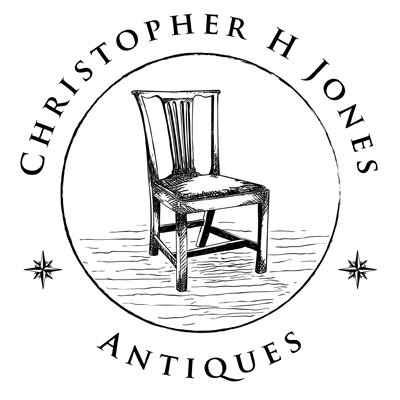Creamware with transfer print and traces of original gilding
Attributed to Herculaneum Pottery, Liverpool, England
Circa 1807-1809
H: 8″: Diameter at bowl 6″.
Ex: Teitelman Collection
While the majority of creamware jugs and bowls were decorated with portraits of famous individuals, ships, allegorical or historical imagery, a few featured political caricatures. On one side is a version of an English cartoon known as “A Picturesque View of the Nation” in which a cow symbolizing commerce is being milked by the American president Thomas Jefferson. John Bull and “Bunoparto” are depicted pulling at the head and tail of the cow in their long competition over trade and military supremacy. The caricature is a clear reference to the controversial Embargo Act which Jefferson had convinced Congress to pass in 1807. On the other side of the jug is a stock print of a three masted ship at full sail flying an American flag which likely represented the United States desire that the belligerent powers respect its trading rights as a neutral nation. Jefferson’s policy failed to achieve its intended ends but caused major economic disruptions in the United States, as did similar measures enacted by his successor James Madison. These issues ultimately led to the War of 1812.
Transfer printing had been developed in the period 1750-1760 to produce multiple, low cost images on delftware tiles. With the invention of creamware in the 1760s as an inexpensive and highly improved competitor to both delftware and stoneware, the transfer techniques were quickly adapted to this superior product. Potters and printers in Staffordshire and Liverpool competed fiercely in the last decades of the century for shares of the domestic and international markets, especially America for all forms of decorated creamware consumer goods. By the turn of the century Liverpool with its west coast location had long surpassed Bristol in its trade with North America and was second only to London in vying for this lucrative market. The Herculaneum Pottery founded in Liverpool in 1796 has been described as “the most determined attempt” by businessmen in the port city to copy the successes and profits of the Staffordshire potteries.
Provenance: ex Teitelman Collection
Ref: Success to America Creamware for the American Market, Cat 116.
sold


